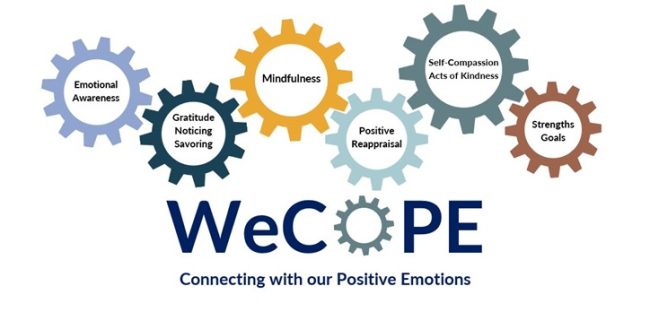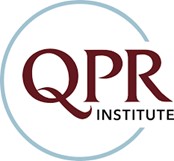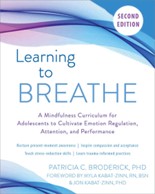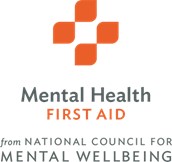Mental and Emotional Well-Being

Health and Well-Being knows how important it is to stay connected with others and to take care of yourself, specifically related to mental health. To support efforts to improve behavioral health in our community, we offer courses such as WeCope to teach adults skills about how to cope with life’s challenges in a healthy way. We also offer Question, Persuade, Refer (QPR), which teaches individuals to how help someone that is in a mental health crisis particularly related to suicide. Specifically for youth, we offer a curriculum called Learning to Breathe that is designed to teach adolescents how to better regulate their emotions, pay attention to thoughts and feelings, and create awareness about staying in the present moment. Additionally, we collaborate with partners to create opportunities to offer Adult Mental Health First Aid and Youth Mental Health First Aid to individuals that interact with other adults or interact with youth on a frequent basis.
To learn more about any of the Mental & Emotional Well-Being programs, please contact Sara Ennocenti (608-757-5059 or sara.ennocent@wisc.edu )

WeCOPE (Connecting with Our Positive Emotions)
WeCOPE (Connecting with Our Positive Emotions) is an evidence-based interactive program that helps adults to cope with both short- and long-term stress. This program has been shown to reduce stress and symptoms of depression, increase positive affect, and improve health behaviors. Through the 11 skills that are taught during the class adults learn to manage life’s challenges in healthy ways in order to take better care of themselves and others. Participants gain the most benefit when they are able to commit some time outside of class each week practicing the skills we review in class. The course is conducted in 1 hour sessions for 7 weeks. The program can be delivered in-person or virtually on the Zoom platform. These sessions encourage practicing skills such as mindfulness, savoring, positive reappraisal, gratitude, and goal setting among others. If you are interested in bringing this program to your organization, church group, or workplace, we would love to tailor a program to fit your needs.

QPR Gatekeeper Training for Suicide Prevention
UW-Madison Division of Extension Rock County is now offering QPR Gatekeeper Training for Suicide Prevention for any adults that would like to learn how to save the life of a youth or adult experiencing a suicide crisis in our community. Gatekeepers can include anyone who is positioned to recognize and refer someone at risk of suicide (e.g., parents, friends, neighbors, teachers, coaches, caseworkers, barbers, bartenders, co-workers, etc.).
QPR teaches three simple steps anyone can learn to help save a life from suicide: Question, Persuade, and Refer. Just as people trained in CPR and the Heimlich Maneuver help save thousands of lives each year, QPR Gatekeepers are trained to recognize the warning signs of a suicide crisis and to respond in order to save a life. Question, Persuade, Refer Gatekeeper training teaches individuals the common causes of suicidal behavior, the warning signs of suicide, how to get help for some one in a crisis and how to question, persuade, and refer someone who may be suicidal.
Sessions will be offered to adult audiences and can be provided either virtually or in person. Learn more about upcoming workshops or to set up a class for your organization, please contact Sara Ennocenti (608-757-5059 or sara.ennocent@wisc.edu ).

Learning to Breathe
Learning to Breathe is a mindfulness curriculum for adolescents to cultivate emotional regulation, attention, and performance. The goal of this curriculum is to encourage the development of awareness and compassion and help students bring more mindfulness to their lives.
Skills learned:
● Present moment attention
● Emotional regulation and compassion skills
● Improve capacity for stress reduction
● Support for executive functions
● Learn to recognize the nature of emotions in order to act on them more carefully
● Apprehend the nature of thoughts in order to cultivate wholesome ones and let go of those that are harmful to themselves and others
● Improve awareness of physical sensations in order to foster health and well-being

Mental Health First Aid
Identify. Understand. Respond.
Mental Health First Aid is a skills-based training course that teaches participants about mental health and substance-use issues. Just as CPR helps you assist an individual having a heart attack, Mental Health First Aid helps you assist someone experiencing a mental health or substance use-related challenge. In the Mental Health First Aid course, you learn risk factors and warning signs for mental health and addiction concerns, strategies for how to help someone in both crisis and non-crisis situations, and where to turn for help.
Mental Health First Aid for Adults teaches people how to recognize signs of mental health or substance use challenges in adults ages 18 and older, how to offer and provide initial help, and how to guide a person toward appropriate care, if necessary. In this highly interactive workshop, participants use scenarios to put the 5-step action plan into practice, in both crisis and non-crisis situations. Topics of discussion include anxiety, depression, psychosis, and addictions.
Youth Mental Health First Aid is designed to teach parents, family members, caregivers, teachers, school staff, peers, neighbors, health and human services workers, and other caring citizens how to help an adolescent (age 12-18) who is experiencing a mental health or addictions challenge or is in crisis. The course introduces common mental health challenges for youth, reviews typical adolescent development, and teaches a 5-step action plan for how to help young people in both crisis and non-crisis situations. Topics covered include anxiety, depression, substance use, disorders in which psychosis may occur, disruptive behavior disorders (including AD/HD), and eating disorders.




